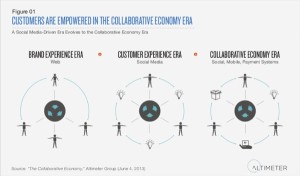
Forget about Growth Hacking, the future is in the Collaborative Economy
VIDEO
Anyone working in digital can somewhat relate to the overuse of loosely defined marketing words – think ‘big data’ or ‘cloud computing’ (bzzzz). Growth hacking seems to be just another one of them.
In colloquial terms, growth hacking is associated with the exploitation of loopholes and the use of illegal techniques online to grow business development. Of course, in some cases this has been reality. When PayPal was first used on eBay, it was actually breaching the retailer’s T&C’s. Similarly, when Airbnb first started they poached their customers from Craigslist by spamming listings and inviting users to join their directory instead.

However, growth hacking can also simply be described as the ingenious use of tools, platforms and environments for business development, online AND offline – Google campus in East London, for example, is a good case of growth hacking taking place offline as start-ups use a shared working environment to maximise their potential. Online, growth hacking is the use of tracking and metric tools that teach us where our time is best spent; and the leveraging of platforms where target audiences and key players are.
‘Hacking’ does not necessarily equal to detrimental consequences for larger corporations either. Indeed, Paypal was then bought by eBay, and when Airbnb developed its interface it added the option to ‘post to Craigslist’.
What I am really describing here is a much bigger picture – it is a move towards the collaborative economy. Craigslist, Airbnb or Freecycle are all excellent examples of collaborative platforms that bring consumers together on the marketplace. Social networks play a key role in the matchmaking process through the use of relevant search filters, enabling people to get what they want from each other whilst also mirroring the values of the 21st century: sustainability, transparency and economic flexibility.
As modelled by Altimeter, social media and technology allowed for the convergence of people and ideas, and it is now also allowing for the convergence of people, ideas, and monetary value. In this system, equal access to technology and platforms allows for improved meritocracy: more power is given to consumers to become active shapers in the economy – especially with start-ups.
Online financial systems have a large stake in this. Take Market Invoice for example, a service that offers to buy invoices from smaller companies that suffer from long wait payment terms from big corporations. For SME’s that do not own collateral assets or trade history in order to be able to borrow from banks, this type of financing is ideal. Similarly, on Funding Circle, funders can invest in SME’s but do so by investing in multiple start-ups as a way of diversifying risk. These new forms of financing offer more control, choice and value and show that the collaborative economy is happening with B2B just as much as P2P.
Here lies the value of social business within the collaborative economy: flexibility, openness and innovation.



